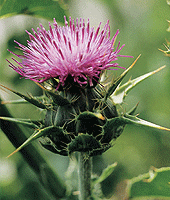Advertisement
Flush Away Toxins
Imagine what would happen to your car if the exhaust system couldn’t remove toxic fumes from the engine. It’s the same in our bodies. When we experience frequent headaches, digestive symptoms, fatigue, recurrent infections, and immune deficiency, it may indicate a need for detoxification therapy. A variety of herbs help remove environmental toxins and replenish … Continued
 Imagine what would happen to your car if the exhaust system couldn’t remove toxic fumes from the engine. It’s the same in our bodies. When we experience frequent headaches, digestive symptoms, fatigue, recurrent infections, and immune deficiency, it may indicate a need for detoxification therapy.
Imagine what would happen to your car if the exhaust system couldn’t remove toxic fumes from the engine. It’s the same in our bodies. When we experience frequent headaches, digestive symptoms, fatigue, recurrent infections, and immune deficiency, it may indicate a need for detoxification therapy.
A variety of herbs help remove environmental toxins and replenish the body maltreated with an inadequate diet. Herbs that increase lymphatic drainage, promote liver and bowel function, and act as nutritive urinary tonics are particularly useful. Here are some of the more important ones.
Dandelion Leaf
Dandelion leaf (Taraxacum officinalis) is a widely accepted diuretic that gently stimulates kidney function without depleting the body of potassium. The fresh root is indicated for chronic constipation due to poor digestion, poor fat metabolism, and sluggish liver function. It also promotes the growth of healthy bowel flora. Dandelion leaf and root are effective as a tea or tincture and can be safely consumed in frequent doses.
Burdock
The leaf, root, and seeds of burdock (Arctium lappa) can be used long term to increase lymphatic, kidney, and liver function. Its bitter action stimulates bile secretion to aid digestion. Burdock is also a valuable remedy for chronic dry, scaly, and itchy skin conditions that may be a result of toxicity. The seeds act as an excellent diuretic and, for those considering a detoxifying fast longer than three days, burdock helps to maintain peristalsis and prevent blood from becoming too acidic.
Bupleurum Root
Bupleurum root (Bupleurum falcatum) is a prominent liver herb also known as Chai hu. The dried root is typically used in traditional Chinese medicine as part of the herbal formula to treat stagnant liver qi (energy). The symptoms of this condition may include a feeling of fullness in the liver, pain on the right side, biliousness, a coated yellow tongue, difficulty digesting fats, and abdominal bloating.
Stinging Nettle
Stinging nettle (Urtica dioica) is often used as a spring tonic and general detoxifier to strengthen and support all organ systems, as the leaves are high in chlorophyll, calcium, magnesium, and dietary fibre. Nettle combines well with other nutritive rich herbs often found in detox remedies, including alfalfa, red clover, and cleavers (goose grass).
Milk Thistle
Many herbal cleansing and detoxification formulas contain milk thistle (Silybum marianum). The seed extract is used for a wide range of liver and gallbladder conditions, including increasing bile flow to help remove toxins from the body. Despite its value in detoxifying and protecting the liver, some herbalists feel that milk thistle should only be used for more serious conditions such as acute hepatitis or cirrhosis, to help liver function impaired by exposure to chemical solvents and certain medications, and as an antidote for mushroom poisoning.
It is important to remember that herbs work best when combined with dietary changes, an adequate intake of filtered water, and regular exercise to synergistically reduce and eliminate toxic accumulations.
Many herbal detoxification products are available. Consult a qualified herbalist or your local health food store for help choosing one that is right for you.




